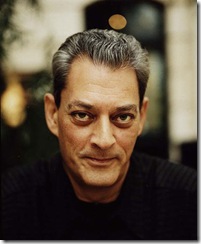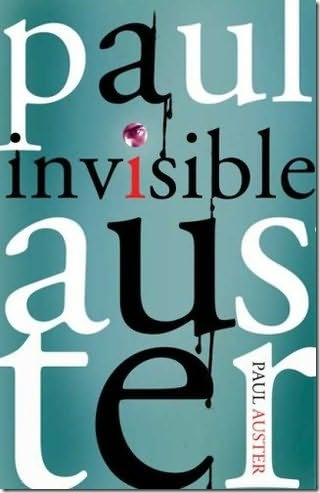It would be too much to say that Paul Auster’s latest novel constitutes a comeback or even a return to form.
His recent work, although sometimes roughed up by critics, has not exactly been inferior, or the product of an imagination grown slack with maturity and success. Yet for all that Auster accomplishes with, say, Man in the Dark (2008), it is a small book. Its effects, however tricksy and convincing, are those of the curio, the miniature.
 With Invisible, Auster thrusts all this aside like a man clearing a table with his arm. A coming-of-age story that also encompasses an entire life, the narrative bristles with Auster’s characteristic fascinations – identity, language, the intersection of genre and literature, the unreliability of memory. But there is nothing small about it. This is a major work, by a major artist.
With Invisible, Auster thrusts all this aside like a man clearing a table with his arm. A coming-of-age story that also encompasses an entire life, the narrative bristles with Auster’s characteristic fascinations – identity, language, the intersection of genre and literature, the unreliability of memory. But there is nothing small about it. This is a major work, by a major artist.
Invisible starts out as a memory novel of intellectual New York in the mid-1960s. Paul Walker, aspiring poet, has just enrolled at Columbia University. At a party, he meets a worldly French scholar, Rudolph Born, who gives off a faint whiff of decadence. The two men, one poor and 20, the other modestly rich and 35, have barely started a friendship when Born makes an astonishing proposal.
Born has come into a small fortune and he decides to use a portion of it to establish a new literary magazine. Walker will be the founding editor, with a generous salary. The young poet can barely believe his luck, and, indeed, wonders fleetingly why Born would select an untried writer to head up such a project.
This first 70-page section of Auster’s novel captures the flavor of its place and time exquisitely. New York is shabby but sophisticated. Sexual experimentation is in the very air – Walker sleeps with Margot, Born’s enigmatic 30-year-old girlfriend, and no one gets too upset. The story seems to be shaping up as a kind of ‘60s novel itself, one that fictionalizes the early history of some real magazine, The Paris Review, say.
One evening, walking to dinner, Walker watches in horror as Born slips a switchblade from his pocket and expertly knifes a pistol-wielding young mugger to death. Viewing Born as a murderer, Walker files a report with police. By then, Born has abandoned his teaching post at Columbia and fled home to France. Walker, shaken, resumes his life as an impecunious student.
This turn into lurid violence jars, but Auster handles the abrupt tone shift adroitly. The next section opens in the voice of Jim Freeman, a famous American writer, who has received a letter from an old college chum, Paul Walker, not seen for 40 years. At 61, Walker is dying, and has been working on a memoir. Freeman agrees to look at it, and finds the first section, which we’ve just read, worthwhile.
Encouraged, Walker sends a second section, in which he beautifully renders the tragic story of falling in love with his own sister, and the brief incestuous affair they conducted before he left for a year of study in France.
Freeman finds the manuscript moving, not disgusting, as Walker feared. Before he can tell his friend, Walker dies, but not without arranging for Freeman to receive a third portion of the manuscript, partly in notes. It is an account of the few weeks Walker spent in Paris, where he concocts a daft scheme to ruin Born’s engagement to a sensible bourgeois widow. This involves befriending her bright but immature daughter, Cecile. Born easily outwits Walker, and sends him in disgrace back to New York, but not before the younger man has inadvertently broken Cecile’s heart.
While traveling in Europe not long after, Freeman, fascinated with the story, looks up Cecile, now in her late 50s, a plump and amiable scholar. She remembers Walker fondly, and harbors a profound regret for how harshly she treated him at their last meeting. She gives Freeman a portion of her diary, a portion that completes the story of Walker and his nemesis, Born.
This reliance upon written words and events recalled long after the fact — half-finished manuscripts, diaries, letters, phone calls, a couple of personal interviews — allows Auster to play with his customary post-modernist devices. But he writes with such hypnotic potency that a sort of magic occurs, and all the devices transmute into a pane of glass through which we see what we really care about, Walker’s story and the people in it.
Invisible is the novel Auster’s fans have been waiting for, the kind of novel, by its alchemy of literary skill, compelling story and affecting characters, stakes its claim to lasting greatness.
It is certainly one of the best books of the year.
Chauncey Mabe, former books editor of the Sun-Sentinel, can be reached at cmabe55@yahoo.com. Visit him on Facebook.
Invisible. by Paul Auster; Holt; $25; 320 pp.
